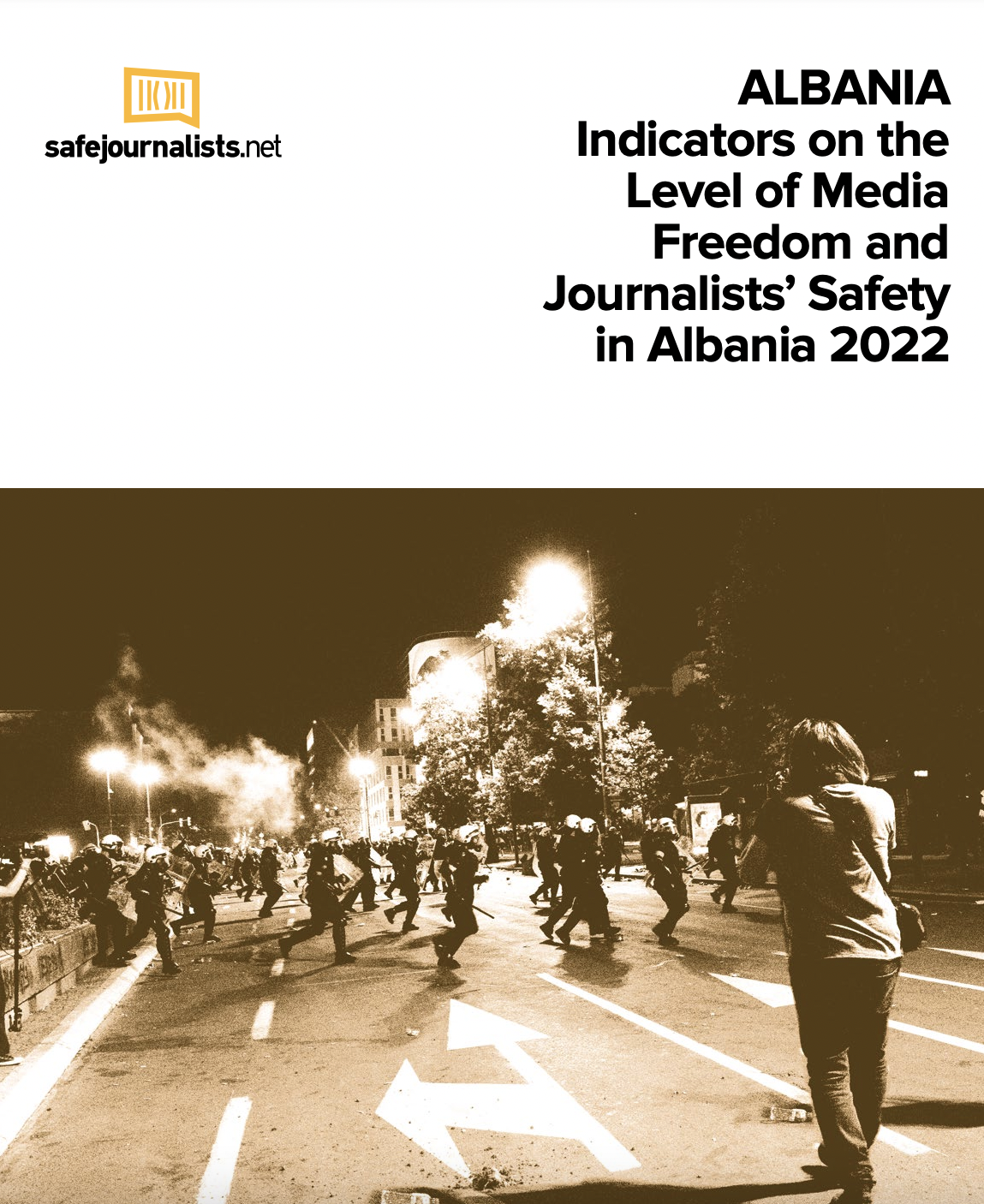
Safe Journalists Network in Albania in cooperation with the Center Science and Innovation for Development (SCiDEV) presented key findings of the Report Indicators on the Level of Media Freedom and Journalists’ Safety in Albania 2022 with stakeholders from the media and civil society to discuss the findings of the Safe Journalists Report, reflect on the media freedom and safety of journalists in Albania particularly considering recent developments in 2023.
The report is prepared annually with the assessment of the situation conducted on the basis of standardized methods for data collection and analysis. The journalist’s associations from the Western Balkan countries, with the support of the European Commission, have set up a joint platform Safejournalists.net to monitor changes in their countries’ legislation and practice and to engage in various advocacy activities aimed at advancing political, legislative, and institutional environment in which the journalists and media work. Starting from 2020, the members of the platform monitor the situation in seven countries (Albania, Bosnia and Herzegovina, Croatia, North Macedonia, Montenegro, Kosovo[1] and Serbia). The assessment and report for Albania is done by Blerjana Bino and presentation with the support of the Center Science and Innovation for Development (SCiDEV).
In 2022, despite constitutional guarantees for media freedom, freedom of expression, and information, Albania saw signs of deterioration in these areas. On a positive note, the anti-defamation package was withdrawn, and the government did not introduce new legal changes during the year. Structural challenges persisted in the media ecosystem, marked by a symbiotic relationship between powerful economic and political interests, which sometimes included organized crime. Cases of conflicts between the Prime Minister and media owners, such as Top Media Group and Focus Group, were seen throughout the year. Media ownership concentration remained high, with a limited advertising market and a few individuals or families controlling a majority of outlets. This situation hindered media plurality and contributed to declining trust in media. No significant progress was made in promoting media plurality in 2022.
Public information concentration continued during the year, as government propaganda efforts, opposition disinformation campaigns, and political actors’ attempts to replace genuine journalism with pre-prepared content impaired independent and accurate reporting. This trend eroded the diversity of voices needed for a healthy democracy. Access to information was restricted due to a lack of political will, a culture of secrecy, and weak accountability measures. Investigative journalism was particularly impacted, and proposed changes to the Law on Access to Information did not fully address media organizations’ and civil society groups’ requirements. Media accreditation regulations introduced by public authorities further limited journalists’ access to information.
The quality of media content declined as self-censorship increased and space for independent, critical journalism shrank. The practice of using media outlets for blackmailing risked becoming normalized, and issues like fake news, hate speech, disinformation, conspiracy theories, and propaganda further deteriorated Albania’s media landscape.
Actual attacks on the physical safety and life of journalists and their kin remain limited in Albania. However, few cases that are reported are not investigated properly or there is limited transparency. Albania’s state institutions have not yet established effective mechanisms specific for journalists and media staff to provide protective measures when they are threatened. 18 attacks (12 M and 6 F) registered in 2022. Journalists’ safety is threatened by the weak implementation of labor codes, gender-specific challenges in the media sector, digital safety concerns, gendered disinformation, and general anti-media sentiment and pressures. Journalists working in local media, young journalists, and women journalists face more challenges.
In the first quarter of 2023, Albania experienced growing political polarization, which weakened opposition groups and impacted the media landscape. This situation raised concerns about potential challenges to media freedom and independence in the country. There were reports of media groups facing arbitrary inspections and fines, which led to worries about their ability to operate without pressure or intimidation. As local elections approached, the use of advertising and public resources for electoral campaigning increased. However, concerns about conflicts of interest arose when the Media and Information Agency Director took a temporary leave to campaign for the ruling party. Furthermore, the use of artificial intelligence for disinformation campaigns became a growing concern in Albania. Efforts to improve media freedom were attempted, but success relied on local ownership, inclusiveness, and genuine consultation with local stakeholders
Recommended actions
- Efforts to improve media freedom in Albania must prioritize inclusiveness, local ownership, and genuine consultation with relevant stakeholders such as media organizations, civil society, and other interest groups. It is important to ensure transparency and a participatory approach throughout the process to build trust and credibility.
- Efforts to promote media pluralism and diversity of viewpoints, including measures to counter media ownership concentration and support the development of independent and alternative media outlets.
- Strengthening legal protections for journalists and freedom of expression, including measures to enhance access to information, protect whistle-blowers, and combat disinformation and propaganda.
- Addressing issues related to media professionalism, such as improving journalistic standards and ethics, enhancing training and development opportunities for journalists, and promoting media and information literacy among the public.
- Advancing digitalization of the media sector including enforcing data protection legislation, strengthening digital security, countering gender disinformation, and exploring innovative models for sustainable media financing.
[1] This name is without prejudice to the status and in accordance with United Nations Security Council Resolution 1244 and the opinion of the Tribunal on the Declaration and Independence of Kosovo.
Presentation Tirana 31 March 2023
Find here the full report in English